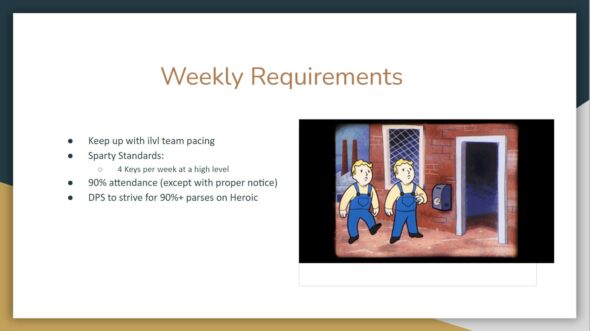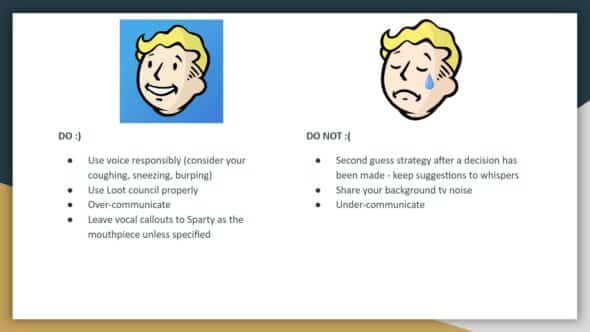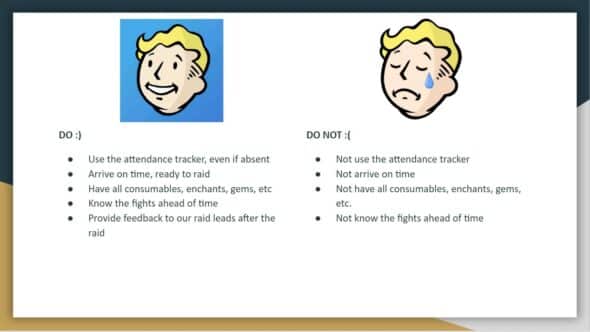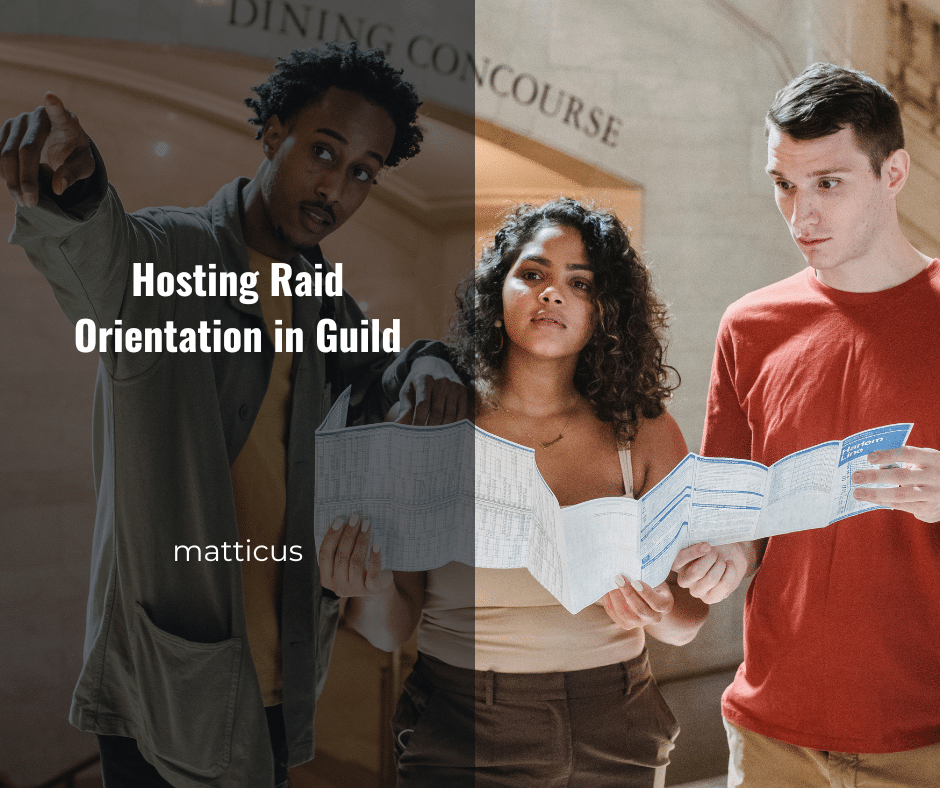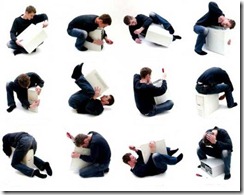This is an interview in a (hopefully) ongoing Interview with a GM series. Today, we sit down with Mel of Edge and one of the bloggers at Sacred Duty.
At what point in your gaming life did you suddenly decide that you wanted to be a guild leader and what led to that decision?
I can only really answer the spirit of the question, and not the substance of it, because Edge doesn’t have a Guild Leader. The GM is a level 1 alt, and you can’t prove that it’s me. We run with a council of officers. There are four of us – I’m the Raid Leader and tank officer, but it’s much more than a one-man show. We all work very hard to keep the guild running effectively.
As far as being in a leadership position in a guild goes, though, it’s not something I’d ever thought about before it was inflicted on me. I was a fairly new raider when I joined Edge – I was inexperienced, but they headhunted me out of a ZA pug (the original ZA). About three months after I joined Edge, the RL and MT retired, and the other officers asked me to take the job. I was young and naive and should have known better.
Raid leading can be very rewarding, but it’s a lot more extra work than I would have believed when I first took the job on, and a lot more added pressure. I decided to take the job they offered me because I didn’t know how much work it was going to be, and I wanted to give back to this nice guild that was letting me see content with them. I’m not sure I’d be able to make the same decision knowing what I know now – but I wouldn’t give up the experience, either. I’m not sure I can explain that dichotomy any more clearly, as much as I might wish to.
Tell me about the loot system your guild uses and how it fits in with your guild’s culture.
We use loot council. In my opinion a properly run loot council is the most progressive loot system. It allows you to put loot where it will best assist the raid in downing bosses. It prevents any worries about DKP hoarding with tier tokens. So long as the loot council isn’t corrupt, there isn’t much of a problem with drama. In the 3 years that I’ve been an officer in Edge, we haven’t had an issue with corruption. Loot is handled fairly, but we’ve been able to deflect loot onto DPS or healers when we’re stuck at a particular gear check to help us over that hump. It’s never going to be an enormous difference, but small advantages add up.
What is the typical application process like? How are players handled who pass and those who don’t pass your standards?
All apps get posted to a private members forum for our guild. Good ones will get contacted for an interview. Our interview process is typically fairly long and involved, and it focuses mainly on “getting to know you” types of questions. WoL can tell us if a player is good, but it’s very important to us that people will fit in with guild culture. We want to get a sense of people in an interview, and we want them to get a sense of us. If people are going to spend up to $55 to raid with us, we want them to have a very high chance of success in the trial.
Following a successful interview, there’s a 4 week “initiate” period, where people get to prove that they’re worth a raid slot. The biggest hurdle to clear is not standing in fire. It’s an unofficial policy with us that nobody fails in their first raid – it’s hard to join a new guild, often a more progressed guild, with new strategies, and immediately be perfect. But we do expect trials to be competitive with our established raid force in most performance criteria (gear is taken into account) very quickly. We can’t afford to carry people. Generally we have a fairly high success rate on trials, roughly 75%. We like to believe it’s due to the thorough interview process, thorough vetting of the application and logs, and because we’re willing to give trials a real legitimate second chance, no matter how disastrous the first raid was. Some of our best raiders had a horrible first week.
If someone fails their trial, they’re either offered friend rank in the guild, or they’re asked to gquit “at some point in the next couple of days, when it’s convenient”. It basically depends on how much a part of the guild’s social atmosphere they’ve made themselves. As a general rule, the ways to fail a trial in Edge are to tunnel vision or firewalk. Meters aren’t our primary measurement of playskill.
Rumor has it that your raid group does not utilize ready checks. If it’s true, how come?
Ready checks are an opt-in system, and opt-in systems deflect responsibility. Instead, we make the choice to assume that everyone is at keyboard and ready to play when we’re raiding – when they’re expected to be. We’ll often be discussing strategy during runbacks, so it’s a bad time to just take off the headset and run AFK anyway. If someone has to take an emergency break, the onus is on them to inform the raid, and then we wait. But I don’t see a reason to waste 20 seconds on every pull just to ask if everyone is actually at their keyboard, when I could just be informed that someone isn’t there for the one pull that it’s an issue.
Ready checks are just one convenient example of a culture of personal accountability, though. We always try to encourage personal accountability – own your actions and own your mistakes, and respect the time and effort that thirty other people are putting into the game. Randomly running away from the keyboard is a waste of everyone’s time, so we encourage it to be kept to a minimum as much as possible. “Opt-in” systems are generally bad, because they discourage accountability. You opted in by joining the guild in the first place. The onus should be on individuals where possible, rather than on the raid leadership.
In your opinion, is it possible to be an elite player without being elitist? (As in, extremely skilled without the negative, berating attitude).
A little bit of elitism isn’t always a bad thing. It’s okay to be proud of your accomplishments in WoW. It’s okay to know that you’re a skilled player. You can be an elite player, and an elitist, without berating, or being negative. In some ways, I think the two parts of the question are completely unrelated to each other.
I’ve seen a fair amount of negative attitude and berating from 5k DPS pugs in LFD, complaining about how bad group DPS is, and how everyone sucks. I’m a fairly good tank, and I’ve never vote-kicked someone from a 5-man in the entire time the system has been around.
Attitude is separate from skill, I think. Being good at Warcraft does not make you a bad person.
Every guild has its share of stories. Whether they’re humorous or inspiring, there’s usually a lesson associated with it. Do you have one you’re willing to share and something to take away?
On May 31, 2010, one of our raiders announced that his wife was pregnant with their first child. At the time, we were working on Heroic Lich King (25). We’d had some very good pulls on the fight, and were nearing a kill – but this raider didn’t know that, because he’d missed a few raid days due to vacation. One of our resident smartasses suggested that Collider should name his child Arthas, if we killed the Lich King that night.
Collider agreed, and made a solemn promise that he would do so. The ending of the story is fairly obvious at this point. We spent the entire three minute RP phase at the tail end of our first H-LK kill tormenting Collider about what his wife was going to do to him when he told her he’d promised to name the baby Arthas – male or female. We spent the next seven months inquiring solicitously about baby Arthas, guild mascot.
We were unable to convince him to promise to name his second-born Halion. I guess he learned his lesson.
How do you evaluate underperforming players? Is there a window of opportunity for them to work themselves back in and if not, what eventually happens to them?
The short answer is that underperforming players get a talking to (several, actually) and a chance to shape up. We’re very very tolerant of people who’ve made it to raider rank. It takes a lot to get demoted for performance reasons. It helps that we recruit for a certain self-motivated attitude, and a sense of personal responsibility, I think. I have never had to demote a raider for performance reasons, in three years. In a couple of cases, people have demoted themselves, after realizing that they just weren’t willing to make the commitment to keeping up that they used to be.
I firmly believe that loyalty works both ways – that it HAS to work both ways. Someone who has demonstrated loyalty to the guild deserves the opportunity to fix things. That’s the commitment that we make to people in order to earn that loyalty. The guild stands by it’s membership, and the membership stands by the guild.
Evaluation is fairly easy, though – ask the healers. They know who’s taking damage that they shouldn’t, they know who’s using healthstones, and they know who’s healable and who isn’t. Healchat can always tell you who’s underperforming. The meters are the last thing anyone should look at to evaluate performance, in my opinion. You can teach anyone to run a rotation, it’s the easiest thing to fix. But you can’t teach reaction time, or survival instincts. Dead DPS does zero DPS – we try not to recruit firewalkers.
If you could say one thing to a player who aspires to start their own raiding guild, what would it be?
I don’t know, I never started a guild. That’s a terrifying prospect. A much better idea is to join a raiding guild and somehow have them thrust leadership upon you. It’s much less work.
More seriously, I would suggest that you figure out your goals and policies in advance and write them down. You can modify them later, as necessary, but you need to know what your guild exists for, and how you’re going to accomplish those goals. Are you a hardcore raiding guild? How many hours a week are you looking to raid? What ranking are you aiming at, roughly? What do you need to do to make all those goals happen? Do some research, have an idea of what you’re getting into. And above all, have clear goals, and clear policies designed to support that goal. Everyone who joins the guild will have an idea of what it’s about, and when you make decisions based around the goals and policies everyone will know where they’re coming from. And when you have to go “off book”, think it through, and be consistent. Avoid making exceptions, because when you do it once, you’re stuck dealing with exceptions forever.
When raiding, what’s considered a good day? A bad day? When would you call raids early?
There’s a few obvious situations when we’ve called raid early: when all the content is dead. Or when we’re obviously not going to finish all the content in one night, but would only need an hour or so on the second night, we might finish half an hour early on night one. We call raids “early” by a minute or two if the next pull would take us overtime, or if a boss dies such that we don’t have time to get a pull on the next boss after clearing trash. But we don’t ever call raids early for “bad performance” – especially in progression. Sometimes, pounding your head against something is worth doing, just to know how much it hurts so that people avoid doing it again.
A good day and a bad day entirely depends on context, but for me it’s less about how much we get done than it is about how well we play. We had nights in T11 where a lot of content got cleared, but it still felt like an awful night, where the raid wasn’t focused, and there was a lot of “phone it in” play. We had nights where bosses just wouldn’t seem to die that were fairly good nights overall. I’m a happy raid leader when my raid is awake and paying attention and engaged, and I’m an unhappy raid leader when the converse is true.
Thanks again Mel!
